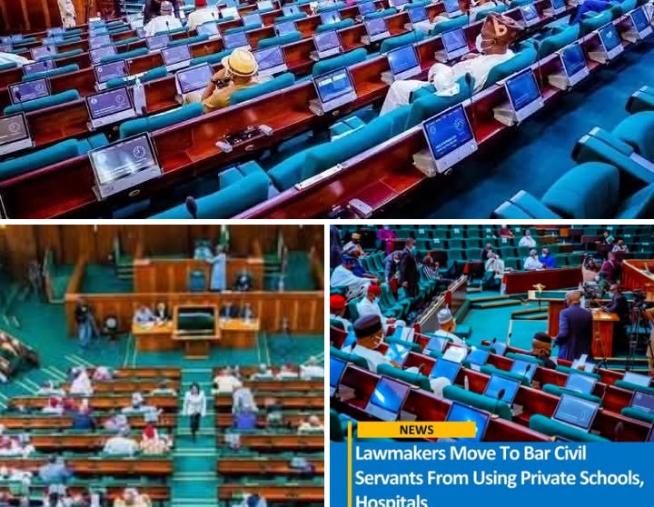‘The bill, wrapped in patriotic ribbons and a sprinkle of institutional guilt, is touted as a noble attempt to “restore confidence” in Nigeria’s public institutions. One lawmaker, passionately defending the proposal, suggested that if civil servants could no longer fly over the rot, they might be inspired to clean it’
Nigeria’s New Development Gospel: A Lesson in Forced Faith
In a grand display of legislative wizardry, the House of Representatives has tabled what could be the most groundbreaking, spine-tingling proposal in recent Nigerian history — a bill to ban public and civil servants from patronising private schools and healthcare services. At last, development has found its champion: not through increased budgets, not by hiring qualified teachers or fixing broken hospital beds, but by barring the elite from escaping the chaos they themselves nurtured.
The bill, wrapped in patriotic ribbons and a sprinkle of institutional guilt, is touted as a noble attempt to “restore confidence” in Nigeria’s public institutions. One lawmaker, passionately defending the proposal, suggested that if civil servants could no longer fly over the rot, they might be inspired to clean it. Apparently, nothing motivates a nation’s bureaucrats more than being forced to enroll their children in dilapidated classrooms and queue for paracetamol in understaffed hospitals.
Yet, one cannot help but wonder if this is true reform or just premium satire dressed as policy. If passed, this bill might set off a thrilling new season of political theatre, where permanent secretaries are caught sneaking into private hospitals under cover of darkness and senators register their children in public schools only to promptly assign them ten security details and a private tutor.
Satirical as it sounds, the idea could turn Nigeria’s ruling class into accidental whistleblowers. Imagine the permanent secretary of education writing a memo about broken desks only after his child falls off one. Or a health minister realising the need for oxygen supply after a personal visit to the emergency ward ends in a referral to a prayer house.
Of course, the proposal remains conveniently silent on the elephant in the executive chamber — politicians themselves. Will ministers and governors be subjected to the same constraints, or shall they continue to shuttle between London and Dubai in search of “consultations”? One may argue that development starts at home, but in Nigeria, home is often abroad.
Skeptics suspect the bill is less about reviving confidence and more about harvesting headlines. After all, it’s easier to pass a law than to fix a leaking roof in a secondary school. It’s even easier to declare a public hospital as “world-class” than to equip it with gloves, syringes, or a functioning generator.
Ironically, if the bill does pass and is genuinely enforced, Nigeria might stumble into development by accident. With no escape hatch, those who once governed with reckless detachment may suddenly become evangelists for reform, demanding the same quality they once ignored. But if history is any guide, the odds are higher that the bill will quietly retire into the archives of legislative amusement, right next to the proposals to ban foreign rice and regulate witchcraft.
Until then, Nigerians can sit back and enjoy the unfolding drama — a political reality show where development is a punchline, and sincerity is as elusive as constant electricity.
© Copied



